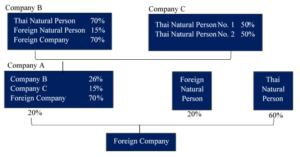ILAWASIA CO.,LTD. | View firm profile
Thailand generally prohibits foreign nationals from owning land. However, there are notable exceptions that allow land ownership under specific conditions. For instance, a foreigner may acquire land for residential purposes if they invest a legally prescribed minimum amount. Additionally, land ownership may be granted under special laws, such as those related to investment promotion privileges.
When it comes to companies, the Land Code sets clear rules for determining whether a company qualifies as “foreign”, which in turn affects its eligibility to own land. According to Sections 97 and 98 of the Land Code, a company will be classified as a foreign entity if:
- Foreign shareholders hold more than 49% of the company’s registered capital; or
- More than half of the total number of shareholders are foreigners.
To verify a company’s landholding rights, authorities examine the full chain of shareholding to ensure compliance. If a company meets either of the above criteria, it is deemed foreign and, as such, is restricted from land ownership under Thai law.
Example of shareholding structure of foreign companies according to the Land Code of Thailand

Due to the legal restrictions on foreign land ownership in Thailand, any Thai company with foreign shareholders is subject to close scrutiny by the Land Office during land registration processes. Land officers (referred to as “officers”) are required to carefully examine whether the company’s shareholding structure complies with Sections 97 and 98 of the Land Code. Specifically, they assess whether foreign shareholders hold no more than 49% of the registered capital and whether the number of foreign shareholders does not exceed half of the total shareholders.
This scrutiny doesn’t end at the time of land acquisition. Each year, typically in June, the Land Office conducts a follow-up review of Thai companies that own land and have foreign shareholders or directors. A list of such companies is sent to the Business Information Service Office or the Department of Business Development (DBD) to verify whether any of them have transitioned into foreign companies under the Land Code.
If any company is found to have become a foreign entity through changes in its shareholding or structure, the consequences are serious. Under Thai law, all land held by such a company must be forcibly sold.
The Checking Guidelines for Preventing Holding Land for the Benefit of Foreigners
To safeguard against circumvention of Thailand’s restrictions on foreign land ownership, the Land Department has issued strict guidelines for land officers when dealing with companies that may be acting on behalf of foreign interests.
Under Section 74 of the Land Code, land officers have the authority to investigate all parties involved in a land transaction. This includes summoning individuals to provide statements and requiring the submission of relevant documents and evidence. Based on these findings, the officer must proceed according to the case’s specific circumstances, following the Ministry of Interior’s investigative guidelines.
These guidelines direct officers to closely examine certain red flags that may indicate a company is holding land for the benefit of foreigners. These include:
- Foreigners who are authorized signatories for the company;
- Foreign nationals listed as company promoters;
- Foreigners holding preferred shares with superior voting rights;
- Foreign shareholders partnered with Thai nationals who are lawyers or brokers—potentially serving as nominee shareholders.
The officer must verify facts as follows:
- Investigate the income of Thai shareholders: by verifying their occupation and monthly income with supporting evidence.
- Investigate the source of the funds that Thai shareholders brought to pay for shares: Thai shareholders must provide evidence of the source of the funds to confirm that they were not received from foreign investors.
- Investigate the source of the funds used by a company to purchase land: in case a price of land higher than the registered capital, without registering a land mortgage.
If there is a case where it is believed that the application for registration of rights and legal transactions will avoid the law or it is believed that the said Thai company purchased the land to hold the land on behalf of foreigner, the officer shall request an order from the Minister, and the Minister’s order shall be final.
Penalties for Holding Land for the Benefit of Foreigners
In the event that a land ownership registration, the officer finds that there is a behavior of holding land on behalf of a foreigner from the above investigation, the punishment according to the offenses under the Land Code as follows:
- Foreigners, under Section 111 of the Land Code for illegally acquiring land, punishable by a fine not exceeding 20,000 Baht or imprisonment not exceeding 2 years, or both.
- Company, under Section 112 of the Land Code, punishable by a fine not exceeding 50,000
- Thai nominees, under Section 113 of the Land Code for acquiring land as a representative of foreigner or foreign company, punishable by a fine not exceeding 20,000 Baht or imprisonment not exceeding 2 years, or both.
Conclusion
Land ownership by a Thai company with foreign shareholders is subject to rigorous scrutiny to ensure compliance with the Land Code. Authorities carefully assess whether such companies are, in fact, foreign entities or if the land acquisition is being carried out for the indirect benefit of foreigners. If a violation is found, the company may face serious legal consequences, including forced sale of the land, fines, and even imprisonment.
At ILAWASIA, we provide expert legal counsel on land ownership compliance for companies with foreign shareholders. Our team is well-versed in navigating Thailand’s complex regulatory framework and can assist with incident reporting, filing complaints, and all related legal processes.
AUTHOR
- Tanadee Pantumkomon, Partner
- Sasima Jantarajit, Associate
- Kamintra Piriyayon, Associate
They can be reached at [email protected]